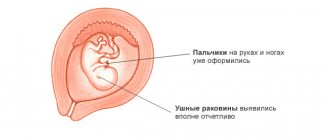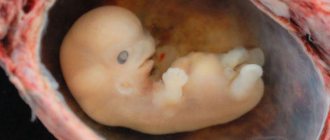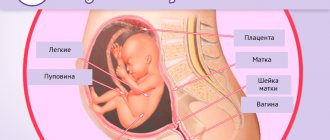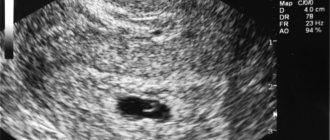4th obstetric week of pregnancy
When talking about the 4th week of pregnancy, you need to understand that this is precisely the obstetric period, that is, the period that has passed since the first day of the last menstruation. But the embryonic period is counted from the date of conception. Typically, this period is approximately 2 weeks.
The 4th–6th week of pregnancy is called the critical period. At this time, many organs and systems begin to form in the fetus, so there is a fairly high probability of developing anomalies that lead to miscarriage.
Possible violations
During this period, a woman should listen carefully to her feelings. Inattention to your health can lead to serious problems. What should you pay special attention to?
Brown or bloody vaginal discharge
Light brown mucus is normal. Its appearance is due to the fact that a woman’s body is adjusting to pregnancy and childbirth. But if the discharge turns dark brown and there is pain in the lower abdomen or lumbar region, you should immediately consult a doctor.
This often indicates the death of the embryo, ectopic pregnancy, threatened miscarriage, or the presence of erosion.
Bloody discharge may appear in several cases:
- The embryo has implanted outside the uterine cavity.
- After sexual intercourse.
- As a result of examination by a gynecologist.
- The embryo froze.
- There is cervical erosion.
Pain in the lumbar region
Appears for the following reasons:
- the woman’s body is preparing for future childbirth;
- body weight increases;
- there are postural disorders, osteochondrosis, etc.;
- the woman suffers from kidney disease.
Abdominal pain along with bloody discharge may indicate a threat of miscarriage. Contact your doctor
Body temperature
On average, the temperature reaches 37.3°C. She can remain this way until childbirth. If there are no accompanying symptoms, there is no need to worry. The temperature may rise due to acute respiratory viral infections or inflammatory processes inside the body, for example, pneumonia.
A woman’s feelings at this time
It is in the 4th week that many expectant mothers find out about their situation, as the first signs of pregnancy begin to appear.
Physical state
Already by the fourth week, a pregnant woman may experience early toxicosis associated with the restructuring of the body. Although some women note that during this period they do not feel nausea at all, moreover, their appetite increases many times.
Already from the first weeks of pregnancy, a woman’s body begins to actively produce the hormone progesterone. It is its influence that leads to the fact that a pregnant woman’s breasts increase in size, swell, and become more sensitive. This is especially noticeable in cold weather, when the mammary glands may even ache outside.
Another feature of the fourth week of pregnancy is a change in mood. This is very individual, but it is likely that the mood of the expectant mother will begin to constantly change even without external influences.
If a woman is not yet aware of her delicate situation, then the fourth week of pregnancy may coincide with the expected start of menstruation. Early signs of pregnancy are very similar to PMS symptoms, so only a delay can help you understand that pregnancy has occurred.

At week 4, a woman may experience early toxicosis
External changes
If we talk about external changes in the 4th week, then at this time a woman may notice a slight increase in the abdomen (usually only 1–2 cm), but this is more likely due to intestinal bloating, which occurs under the influence of progesterone. If a lady does not take care of her figure and wears loose clothes, then this feature of this period may go unnoticed.
Hormonal changes often lead to a woman gaining several kilograms and feeling heavier and clumsier. But if a pregnant woman suffers from severe toxicosis, then, on the contrary, there is probably a slight weight loss.
What happens in the fourth week of pregnancy
At this time, external and internal changes begin to occur in the pregnant woman’s body, which can already be noticed. Among the external changes, of which there are not many yet, one can note an increase in sensitivity and swelling of the breasts, as well as a slight (just a couple of centimeters) increase in the waist.
But there are already enough internal changes. Here are the most important ones:
- The production of hCG begins, which is the first irrefutable signal that pregnancy has occurred. This is the week you should take a home pregnancy test.
- A bubble begins to form around the embryo, which is then filled with amniotic fluid and protects the baby from external influences until birth.
- The placenta and umbilical cord begin to form, thanks to which the baby will be able to receive everything he needs from the mother (air, nutrients, minerals, water) before birth. The waste products of the fetus will be excreted in the same way. The formation of the placenta ends at the twelfth week.
4 weeks Your baby is the size of a poppy seed
Changes occurring in a woman's body
Already from the 3rd week of pregnancy, the woman’s body actively begins to produce the hCG hormone. At week 4, its concentration is 101–4870 mIU/ml, thanks to which pregnancy can be determined using a blood test. If we talk about rapid tests, then only the most sensitive of them will be able to show the correct result, and then at the end of the week. The corpus luteum continues to produce the hormone progesterone, the concentration of which is on average 18 Nmol/l.
In the fourth week, the uterus is not yet greatly enlarged in size; it does not extend beyond the pelvic area, but begins to gradually soften and swell. Active blood flow to this organ begins. A mucus plug forms in the cervix, which helps protect the uterine cavity from various infections.
The breasts begin to change, they gradually prepare for the period of breastfeeding.

At week 4, a woman's breasts become more sensitive
Fetal changes
The size of the embryo at week 4 is approximately 0.36–1 mm. It is still very tiny, but it is during this period that the zygote gradually passes from the fertilized egg into the embryonic stage. But for now, the fruit looks like a round disk with only three layers of cells (endoderm, mesoderm, ectoderm), from which all important organs will eventually form.
Naturally, the embryo cannot yet breathe or feed on its own, but this is precisely why there are three important organs:
- chorion It is a sac from which the placenta will later form. The chorion ensures the supply of oxygen and food to the fetus; a little later it will acquire a network of blood vessels. In addition, this organ also performs a protective function;
- amnion. In the future, the amniotic sac is formed from this organ; it is a source of amniotic fluid. These waters give the fetus protection, help maintain a constant temperature and not dry out the skin in the future;
- yolk sac. It is responsible for feeding the fetus at first until the transport of nutrients from the mother’s body is established. In addition, the yolk sac is needed to maintain the embryo’s immunity; a circulatory system is formed in it to supply important substances.
In place of the burst follicle, on the surface of the ovary (the vesicle in which the egg was located before ovulation), a corpus luteum is formed, which is responsible for the production of progesterone.
Diagnostic tests performed during this period
In the 4th week of pregnancy it is still too early to get registered. At the same time, at this stage mothers often independently diagnose their pregnancy. If you think you're pregnant (or have tested positive), you can go see your doctor.
This is mandatory for those who planned a pregnancy under the supervision of a doctor, as well as for women whose previous pregnancy ended in miscarriage. For everyone else, consultation will be useful, but not mandatory. The doctor will be able to determine the well-being of the pregnant woman, conduct a gynecological examination, and perhaps prescribe the first vitamins.
Analyzes and examinations
The expectant mother, who has just learned about her delicate situation, will most likely want to see the baby on an ultrasound scan as soon as possible. But she will have to upset her - so far the child is only a small lump of cells, so an ultrasound examination will be useless. You can only see a small black dot on it, and not always.
But a blood test for hCG (human chorionic gonadotropin) will be very useful in the 4th week. Normally, the indicator should be 101–4870 mIU/ml - this indicates that the woman is pregnant and is developing normally.
In addition, it is worth taking a blood test for STDs (sexually transmitted diseases), if you did not do this when planning your pregnancy. The fact is that these diseases can go unnoticed, but at the same time greatly interfere with the development of the fetus, especially in the first trimester.
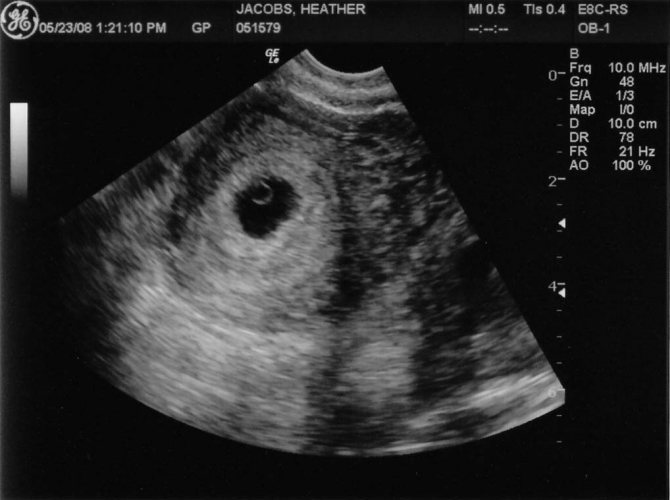
At week 4, the ultrasound will show only a black circle, and that’s unlikely
Signs and symptoms

If the expectant mother’s periods did not make themselves felt until the onset of menstrual bleeding, then if you pay close attention to your health, you can note the following signs and symptoms in the 4th week of pregnancy:
- weakness, lethargy, drowsiness;
- mood swings;
- breast engorgement and tenderness;
- fluid retention and associated minor swelling.
All these symptoms of pregnancy in the 4th obstetric week are the result of the powerful production of progesterone by the corpus luteum, which stimulates the level of hCG that increases every day.
Mothers should be reminded that toxicosis and associated vomiting and nausea should not be expected at 4 weeks of pregnancy. The bond between baby and mother is not yet strong enough to cause such reactions.
As already noted, somewhere on the 24-25th day of the cycle, implantation bleeding is possible at 4 weeks of pregnancy. Its main characteristics:
- lasts 1-3 days;
- never intense, as a rule, spotting brown discharge is present;
- may be accompanied by mild nagging pain in the lower abdomen.
Possible complications
Already from the early stages of pregnancy, a woman may encounter various problems. Most often in the 4th week the following pathologies occur:
- bloody discharge from the vagina. Any bleeding during a confirmed pregnancy should alert the woman. You should visit your doctor immediately, as blood may be a symptom of a miscarriage;
- hypertonicity of the uterus. The tone of the uterus is the contraction of its walls. As a rule, a woman feels nagging pain in the lower abdomen and tension. You need to understand that uterine hypertonicity during pregnancy is very dangerous, since such contractions simply push out the fetus and lead to miscarriage;
- thrush. With the onset of pregnancy, a serious restructuring occurs in the body, due to which the immune system noticeably decreases. Against this background, candidiasis can easily enter the body. This disease must be treated immediately, as it can penetrate the uterus and interfere with the development of the fetus.
The main causes of nagging pain in the lower abdomen at 4 weeks

The causes of nagging pain in the lower abdomen during pregnancy are divided into two categories - physiological and pathological. The first are a consequence of natural changes in the body of the expectant mother. All internal organs and systems adapt to bearing a child for 9 months. Pain of a pathological nature is accompanied by alarming symptoms and indicates the presence of inflammatory or infectious diseases. In this case, urgent hospitalization and effective therapy are required.
Physiological reasons
The main changes that cause discomfort in the lower abdomen:
- Growth of the uterus. Immediately after implantation of the embryo, the uterus begins to gradually increase in size. Because of this, pressure occurs on nearby organs - the intestines and bladder. Discomfort is expressed by a dull nagging pain in the lower abdomen and a frequent urge to urinate. When the center of gravity shifts, aching in the spine may occur. To improve your condition, just take a comfortable position and relax.
- Sprain of the uterine ligaments. As pregnancy progresses, the round ligaments that hold the uterus in the abdominal cavity stretch. If the uterus grows quickly, then the woman feels pain in the groin and lower abdomen. Once the fibers adapt to the changes, the problem disappears. Reducing physical activity, healthy sleep and rest helps you survive this period.
- Hypertonicity of the uterus. The diagnosis is made with increased muscle contraction. Typically, this physiological feature is characteristic of late pregnancy, but sometimes it occurs in the first weeks. Hypertonicity is caused by fatigue, heavy exertion, stress, wearing tight clothes, as well as colds, ARVI and other diseases. To relax your muscles, you need to lie down and rest.
The peculiarity of all the listed causes of discomfort is their short duration. After rest, the discomfort disappears. But if the pain in the lower abdomen intensifies and becomes cramping, then there is a high probability of pathological processes developing.
Pathological causes

There are a huge number of pathologies in the early stages. The most common is miscarriage. Pregnant women also face diseases of the genitourinary system and gastrointestinal tract, oncology, etc. All these disorders, as a rule, were previously present in the body, but a decrease in immunity led to their exacerbation.
Not all gynecologists consider it correct to continue pregnancy for 4-5 weeks in the presence of pathologies. One of the popular theories in the West says that at this stage the body rejects embryos with genetic and chromosomal abnormalities.
Symptoms characteristic of diseases will help to distinguish pathological pain from physiological pain:
- Miscarriage. Pain in the lower abdomen varies from dull, nagging to cramping, intense, sharp. At the same time, the general condition of the body worsens: the temperature rises, you feel dizzy and have a headache, and you want to sleep. Bloody clots appear in the discharge from the genitals.
- Ectopic pregnancy. The pain is localized, acute. The sensations can radiate to the groin, thigh, buttock, but the main focus is on one side of the lower abdomen. Weakness, dizziness, bleeding, and heart rate increase. When the fallopian tube ruptures, the pain increases until loss of consciousness.
- Inflammatory diseases. The stomach hurts like during menstruation, encircling the entire lower abdomen. The temperature rises to 37-38 degrees. The amount of vaginal discharge increases. During infections, the mucus becomes foul-smelling, yellow or greenish in color, and has a foamy or cheesy consistency.
- Uterine fibroids. A benign tumor manifests itself as a nagging pain in the lower abdomen. Discomfort causes growth of formation, which occurs under the influence of hormones.
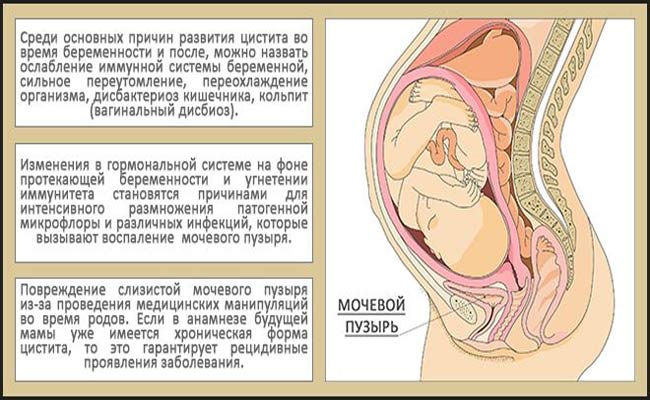
Diseases of the urinary system. These include cystitis, pyelitis, pyelonephritis. Inflammation is characterized by dull, sharp pain in the lower abdomen, frequent urge to urinate, pain and burning in the urethra, increased temperature, and change in the color of urine. When the pathology worsens, fever, chills, and radiating pain to the lower back appear.- Diseases of the gastrointestinal tract (GIT). Abdominal pain is combined with stool disorder and change in stool color. An increase in temperature, constipation, vomiting, and diarrhea are also possible.
- Appendicitis. Classic symptoms of the disease include acute pain in the lower right abdomen, low-grade fever, nausea and vomiting, and constipation. A blood test for acute appendicitis shows leukocytosis.
Regardless of the stage of the pathology, self-medication, much less waiting for the condition to improve, is prohibited. It is necessary to immediately call doctors and get qualified help. Otherwise, the disease may affect the development of the fetus or lead to miscarriage.
Recommendations from experts
Pregnancy is an important stage in a woman’s life and should not be treated negligently. With the onset of a delicate situation, a woman will have to change a lot in her lifestyle.
Nutrition
In the 4th week of pregnancy, when you are already sure that pregnancy has occurred, it is especially important to switch to a healthy diet. Give up fast food, canned food, and processed foods in favor of fresh and healthy food. Meals should be regular and balanced.
A good solution would be to give up frying foods in favor of cooking them in the oven, steaming, or stewing, since fats, carcinogens and various toxins are of no use to a pregnant woman. Particular attention should be paid to vegetables and fruits: there should be as much of them in the diet as possible.
You should not experiment, eat unknown or exotic dishes. You cannot know for sure how the body will react to them, and getting food poisoning during pregnancy is not the best scenario.
Sometimes pregnant women crave something unhealthy, such as chips or canned food. Doctors say that you can eat junk food, but in very small quantities. If such products help lift your mood and relieve irritation, then a spoonful of canned food will do more good than harm.
But you need to give up alcohol completely. Even a drop of alcohol will have a detrimental effect on the development of the baby in the early stages.

With the onset of pregnancy, you should switch to proper nutrition.
Medicines
Many drugs today can be bought without a prescription, so we don’t always think about what we’re taking when we have a headache or stomach ache. But during pregnancy, taking medications should be conscious. You should not take medicine if you are not sure of its safety; it is better to ask your doctor about the drugs allowed in your situation. As a rule, anesthesia and most medications are contraindicated for women in the first trimester.
Stress
Already in the 4th week of pregnancy, a woman can become very sensitive. Her mood changes constantly, she reacts violently to any situation. That is why stress can become almost its constant companion.
It is very important for a woman to come up with a way to calm down and relax, because together with the mother, her baby is also feeling bad. Doctors advise watching some good films, listening to pleasant music, and perhaps cooking if it relaxes you.
You can take a foot bath, do aromatherapy, or even go to a spa for a treatment. Many women are helped by the simple presence of loved ones nearby.
Sports and sex
Quite often, couples calmly have sex in the fourth week of pregnancy, as they are not aware of the delicate position. But even if you already know about pregnancy, this is not a reason to stop having sex altogether. Doctors require limiting sexual contracts only if your last pregnancy ended in abortion, since orgasm increases the tone of the uterus and can cause a repeat miscarriage. But if there were no such situations, but there are no restrictions on sex, you should just be more careful and not try anything extreme.
As for sports, light forms are allowed, for example, gymnastics and yoga for pregnant women. An ideal option for physical activity would be walking in the fresh air.
What not to do
With the onset of pregnancy, you should take your health much more seriously. During this period you cannot:
- smoke. Nicotine and various tars that make up cigarettes can cause poisoning in the fetus. Smoking can also cause oxygen starvation;
- engage in professional sports. It is better to avoid heavy training and constant stress;
- go for x-rays. If possible, try to undergo all examinations and treatment before pregnancy, since X-ray radiation is still harmful to the baby;
- work with chemicals. This applies not only to laboratory and industrial workers. Some types of household chemicals also contain substances harmful to pregnant women, so be sure to study this issue before buying anything;
- contact with sick people. Infection with any virus can be dangerous for the fetus;
- travel by plane. It is in the first trimester that flights and climate change can lead to miscarriage;
- dye and curl your hair. Here we are talking specifically about perms and harmful dyes. Their entry into the body can affect the fetus.
Features of different types of pregnancy this week
Multiple pregnancy, like pregnancy after IVF, has its differences from a normal one.
Multiple pregnancy
The course of a multiple pregnancy at the 4th week is not very different from a singleton pregnancy. If the pregnancy is fraternal, then all the embryos have already been implanted into the uterus, each of which later forms its own placenta. At the 4th week of a monozygotic pregnancy, the egg has already split into two parts. If this happened before implantation, then the fetuses will develop independently, and if after, then they may have a common placenta and amniotic sac.
A multiple pregnancy is not yet visible on an ultrasound; the only way to diagnose it is to do a blood test for hCG. As a rule, the concentration of the hormone is much higher than it should be during a singleton pregnancy, because not one, but several membranes of the fetus are responsible for its secretion.
Pregnancy after IVF
Obstetric weeks during IVF are counted in the same way as during a normal pregnancy, and embryonic weeks are counted from the day of embryo transfer. There are no particular differences in pregnancy after IVF. Typically, around the 4th week, a woman's blood test for hCG is taken to determine whether the fetus has implanted. A woman takes Utrozhestan or Duphaston to maintain hormonal balance in the body. In addition, maintaining a pregnancy during IVF is more difficult, so if the hCG test confirms a delicate situation, you will have to visit the doctor quite often.
Features of multiple pregnancy
If two or more fetuses develop in the uterus at once, this pregnancy is called multiple. If during the fertilization period two or more eggs were fertilized at once, then already in the fourth week of pregnancy each of them is independently attached to the wall of the uterus in its cavity and begins its own, separate development.
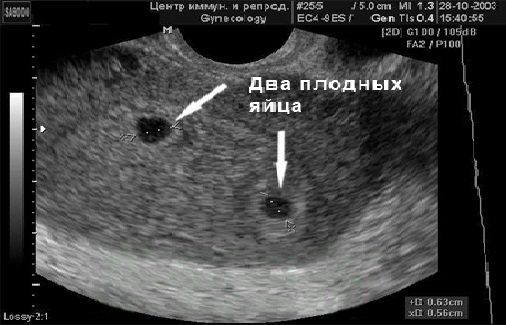
For each embryo, its own chorion and amniotic sac are formed. The babies in this case will be called dizygotic. They can be of different sexes, and necessarily with a different genetic makeup.
If twins are obtained from one fertilized egg, which is divided into two (three or more parts), then these babies will be called identical. Depending on the location of cell division, the formation of the placenta and amniotic sac will depend: if the division occurred at the free blastocyst stage, they will have a common placenta and an individual amniotic sac. And if the division of the egg was at the zygote stage (in the fallopian tube), then each baby will have a separate placenta and bladder.
The same sex and the same gene set occur only in babies who develop in the water bladder with one common placenta.


